When Abby was volunteering at House of Mews, she met Layla, who — much to everyone’s surprise — had recently given birth to a litter of five kittens while she was being transported to the Memphis animal rescue from a county shelter. “She was so thin, no one knew that she was pregnant,” explains Abby. The kittens, who were named Lennie, Louis, Leo, Lana, and Lola, were born on May 19, 2012, and when they were less than two weeks old, two of the newborn cats became extremely sick.
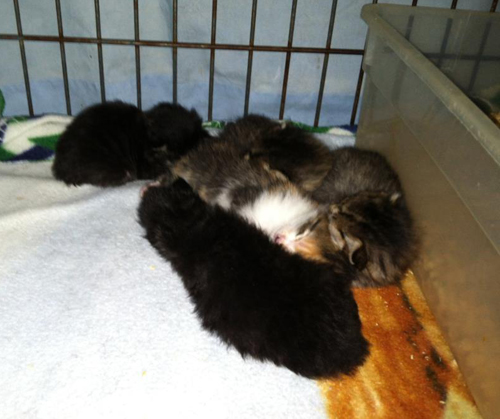
“At only 10 days old, Lennie and Louis had developed a serious upper respiratory infection and they were no longer able to nurse,” remembers Abby. Determined to give the kittens the care they needed — but not wanting to separate them from their family — Abby decided to foster Layla and her babies, allowing her to bottle feed Lennie and Louis.
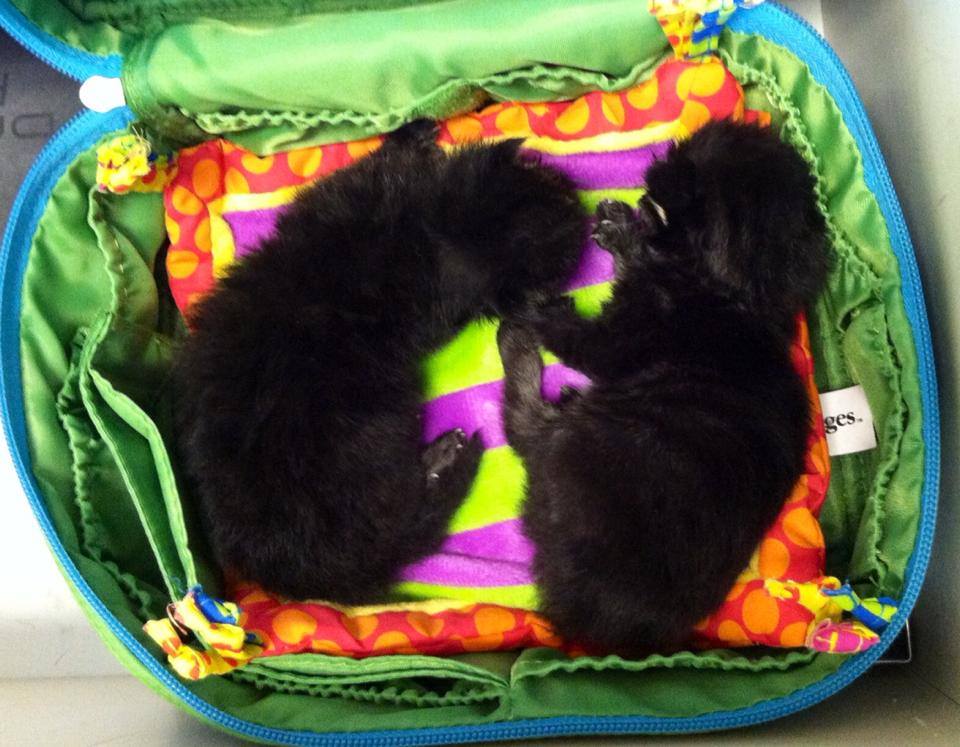
Despite Abby’s heroic efforts, the sickly kittens’ upper respiratory infections turned into pneumonia and a vet gave Lennie and Louis a ten percent chance of survival. Tragically, Louis succumbed to the illness, while Lennie managed to make a miraculous recovery.
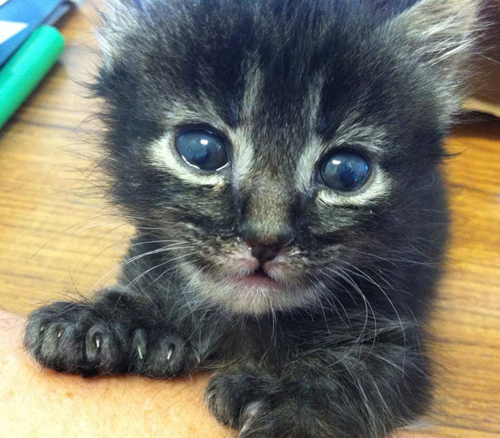
However, when he was five weeks, Lennie became sick yet again, and the prognosis was even worse than before. “Lennie was again diagnosed with pneumonia and I was told that he would not survive,” says Abby, “but once again, Lennie beat the odds!”
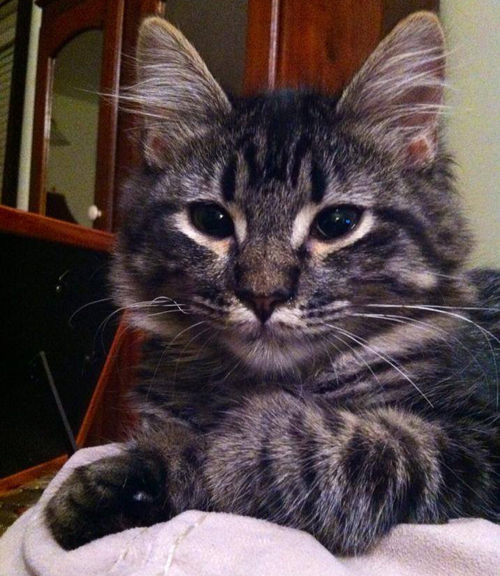
It quickly became apparent that Lennie was a fighter with a strong will to survive, and when Abby realized he was a polydactyl with 22 toes instead of the usual 18, she knew he was truly unique. When Lennie was three months old, Abby learned the kitten’s extra toes weren’t the only thing that made him special. “He was diagnosed with severe pectus excavatum,” explains Abby. “The rib cage deformity was so pronounced, the doctor was astounded that Lennie had lived as long as he had. Lennie’s lungs, heart, liver, and stomach were all compromised.”
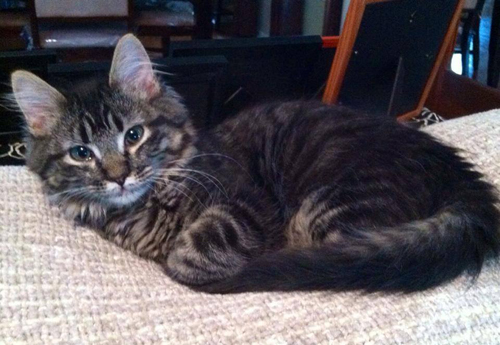
Pectus excavatum, a congenital condition commonly know as “funnel chest,” causes the sternum and costal cartilages to be deformed, making the chest appear flat or concave instead of slightly convex. As a result, cats with pectus excavatum can have difficulty breathing, making it hard for them to perform routine activities, and it can cause recurrent lung infections, vomiting, coughing, and weight loss.
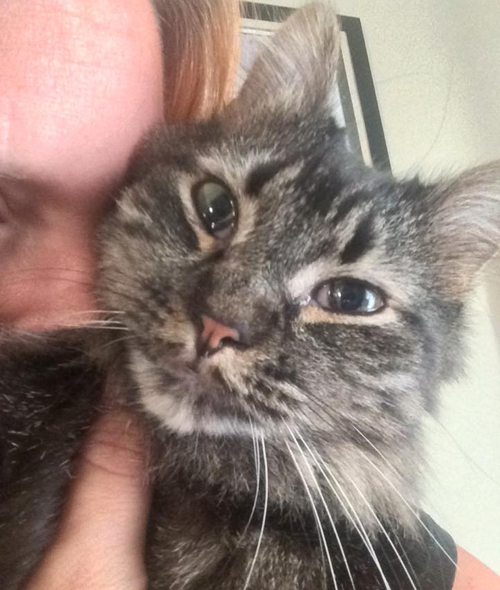
“The common solution for ‘funnel chest’ is inserting a shunt,” says Abby, but it is a risky operation, especially when performed on a young kitten. “After discussing this procedure and all of the risks, we decided that we wanted Lennie to live a happy life for as long as we could. We did not want him to go through the risks, pain and struggles of a major surgery.”
Soon after Lennie was diagnosed with pectus excavatum, Abby realized there was no way she would ever be able to part with him. After all, not only had she developed a special connection with him during the time she was bottle feeding him every two hours, Abby had fallen in love with Lennie as she watched him bravely battle multiple health challenges. “Despite all of his issues and struggles, it never seemed to stop him,” says Abby. “He had — and has — a zest for life. Every moment I was with him — bottle feeding him, keeping him warm — I fell more in love.”
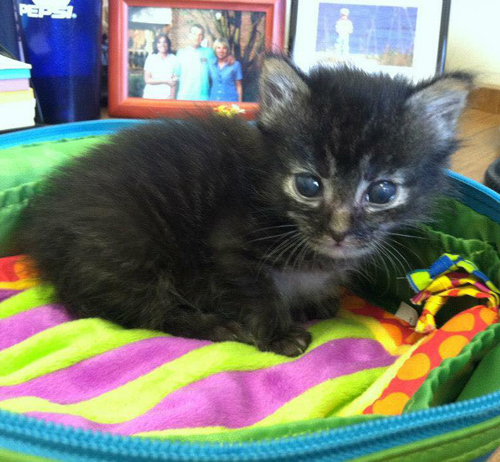
Abby decided to adopt Lennie, and nearly seven years later, she’s so glad she did. Today, Lennie has the enthusiasm and spirit of a kitten, and he likes to run, play, and annoy the senior cats who share his home. “While he must stop and rest frequently and struggles with constant nasal congestion due to deformed nasal passages, he knows no fear, no strangers, and no limitation!” says Abby.
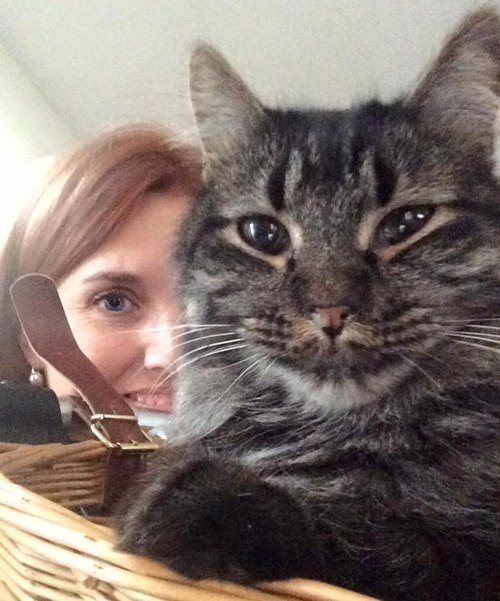
This courageous boy loves making new friends, especially with the animals Abby fosters, and Lennie has an innate ability to reassure and console the cats and kittens who are particularly frightened or timid. “Many of the kitties I foster may be afraid of people, but Lennie comforts them and helps me show them that not all people are bad,” explains Abby.
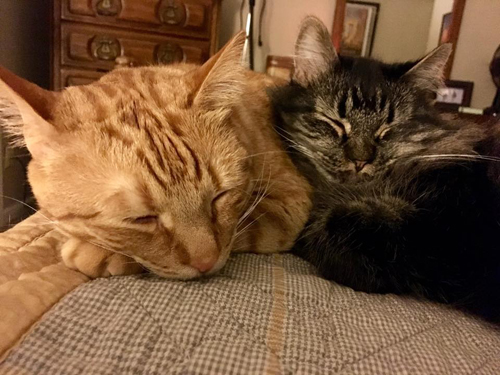
In addition to welcoming new cats to his home, Lennie likes carrying objects around the house, and no day begins or ends without him moving his current favorite items — a beanie baby toy, a slipper, and a sock — from one place to another. “Each night before bed, he carries each one of these upstairs and puts them on the bed,” explains Abby. “Each morning, he carries them all downstairs where they stay until I come home from work.”
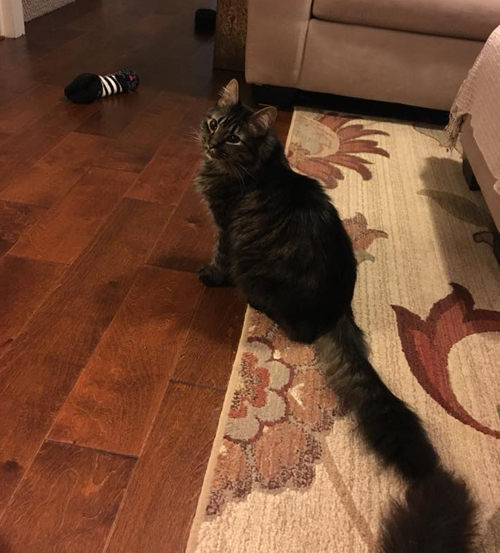
While Lennie is doing great today, he’s had more than his share of health issues over the years, and he hasn’t always been the easiest patient for doctors to treat, though it’s through no fault of his own. “When he does have bad times or gets sick, no one is really sure how to treat him,” says Abby. “It can get very frustrating.” Thankfully, Lennie doesn’t mind going to the vet, because it allows him to meet new people, and he’s very good about taking his medicine.
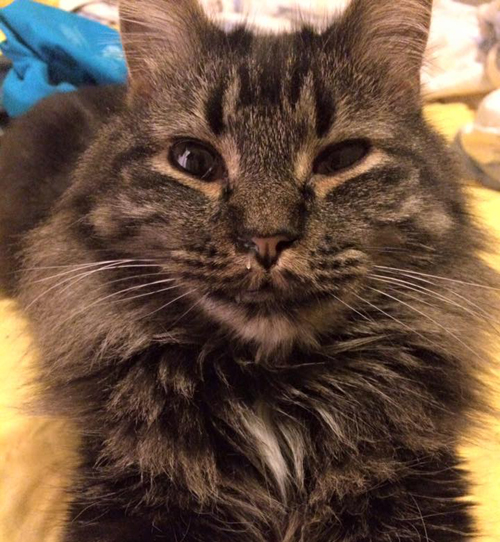
Even though Abby absolutely adores taking care of Lennie, she realizes having a special needs cat isn’t for everyone, although she’s certain it’s a much more enjoyable experience than a lot of people might think. “I think the most common misconception is that having a special needs animal is sad,” says Abby, and while she realizes Lennie might not have the same lifespan as other felines, she’s never regretted her decision to adopt him. “He may not live to 10, 12, or 20, but every day I have him is a blessing,” says Abby. “Lennie never fails to make me smile or laugh with his antics.”
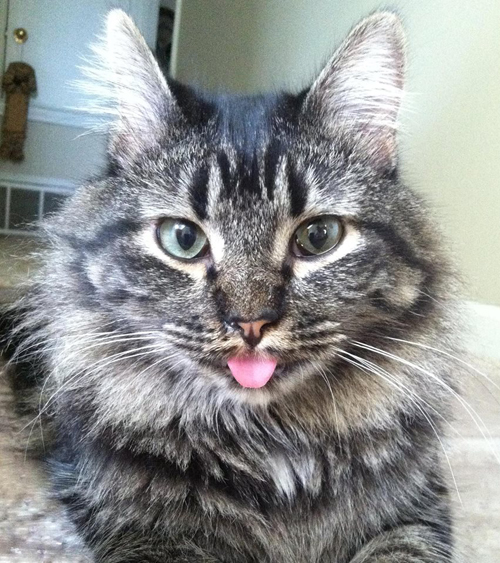
By sharing Lennie’s story, Abby hopes others might be inspired to open their homes to special needs cats, because not only can it be an extremely rewarding experience, caring for a cat with health issues doesn’t necessarily have to be expensive. “So many special needs cats have rescue backing, meaning that all their medical needs will be covered by a rescue, and all you need to provide is the love,” explains Lennie. “These kitties just need someone to give them a chance.”
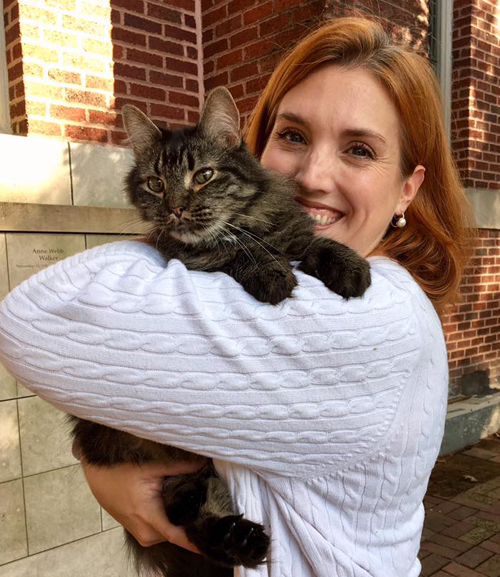
Fortunately for Lennie, when he was 10 days old and struggling to survive, Abby gave him a chance, and nearly seven years later, this handsome polydactyl kitty literally owes his life to her. However, it is Abby who is grateful to Lennie not only for the years of love and companionship he has given her, but also for giving her the confidence to help animals she would have once considered far too challenging for her abilities.
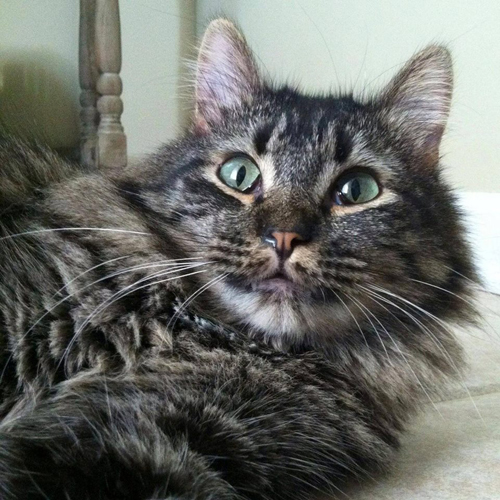
“Before him, I only fostered healthy cats and kittens needing socializing,” explains Abby. “Living with and loving Lennie, I have realized how much special needs fosters are needed. Now, I take in the sick, the dying, and the injured. It is sometimes difficult to do, but I know that they need me and the extra attention and care that I can provide. I am able to do this because Lennie showed me that I could do it.”
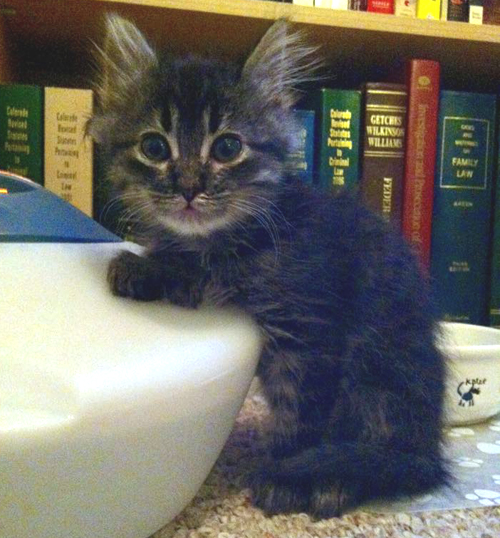
Lennie, who no one thought would live to see his first birthday, also taught his mom to appreciate every moment, especially the ones she shares with him. This May, this stunning tabby boy will celebrate his seventh birthday, a special occasion for any kitty, but a truly momentous day for a cat who has experienced as much as adversity as Lennie. “I celebrated every milestone with him because I was not sure how long I would have him,” says Lennie. “I love him so much and I cannot imagine what my day would be like without seeing him. Lennie is truly a miracle!”
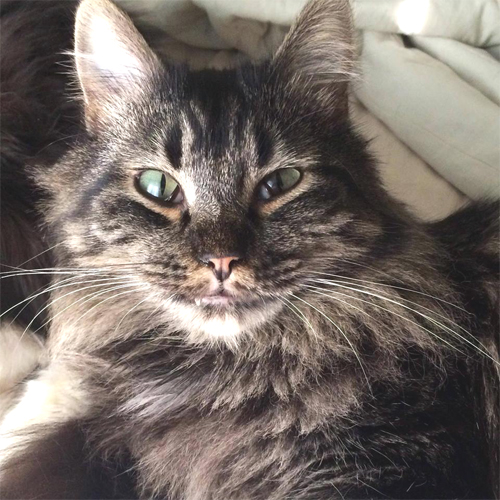
To learn more about this adorable cat, you can follow Lennie on Facebook.



